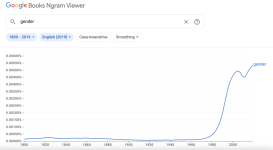- Joined
- Feb 9, 2011
- Messages
- 20,034
- Reaction score
- 7,379
- Gender
- Male
- Political Leaning
- Libertarian
You failed to answer my questions. I felt that they were rather direct. I would ask that you please go back and answer them. But let's still give the below a shot anyway.
ETA: I just realized that this post didn't address the post quoted either.
Whoa there, Hos! you are already changing the goal post and the criteria. Before you said:
So a person who has Klinefelter syndrome (XXY), they would meet the criteria of having 1 X and 1 Y (only 1 and 1 was not specified, and typically allows for variation, hence the questions about that) meaning they are male, but they also meet the criteria of having 2 X, thus meeting the criteria of being female, both at the same time. Further, you did not include androgen receptor gene as part of the criteria.
What do you mean by "Partially met" here?
Where did all this come from? This is not part of your initial set of criteria.
ETA: I just realized that this post didn't address the post quoted either.
OK, so let's use your definition of individuals with a DSD... Which of these individuals do you think it would be difficult to categorize as any one sex within the below assessment structure? Given the below assessment, would you say most Klinefelter syndrome individuals are male or female? I've pasted a comparison to biological males below and one to biological females in the post after it (ran out of room)
Klinefelter syndrome (XXY)
Biological Male Domains and Assessment:
1. Genetic:
A. Presence of x and y chromosomes (met) - score: 1
B. Presence of only one X chromosome. (Not met) - score: 0
C. Sex typical androgen receptor gene functionality on the X chromosome (met) - score: 1
Score: 2 out of 3 or 67%
Whoa there, Hos! you are already changing the goal post and the criteria. Before you said:
Biological Male:
Genetic: Typically has one X chromosome and one Y chromosome (XY).
Biological Female:
Genetic: Typically has two X chromosomes (XX).
So a person who has Klinefelter syndrome (XXY), they would meet the criteria of having 1 X and 1 Y (only 1 and 1 was not specified, and typically allows for variation, hence the questions about that) meaning they are male, but they also meet the criteria of having 2 X, thus meeting the criteria of being female, both at the same time. Further, you did not include androgen receptor gene as part of the criteria.
3. Genital/Gonadal Anatomy:
A. penis and (met) - score: 1
- scrotum. (Met): score: 1
- Develops testes, (met) - score: 1
- Produces sperm. (Partially met) - score: 0.5
What do you mean by "Partially met" here?
4. Non Genital Anatomy (non genital body characteristics and secondary sex characteristics):
5. Brain structure:
Where did all this come from? This is not part of your initial set of criteria.

